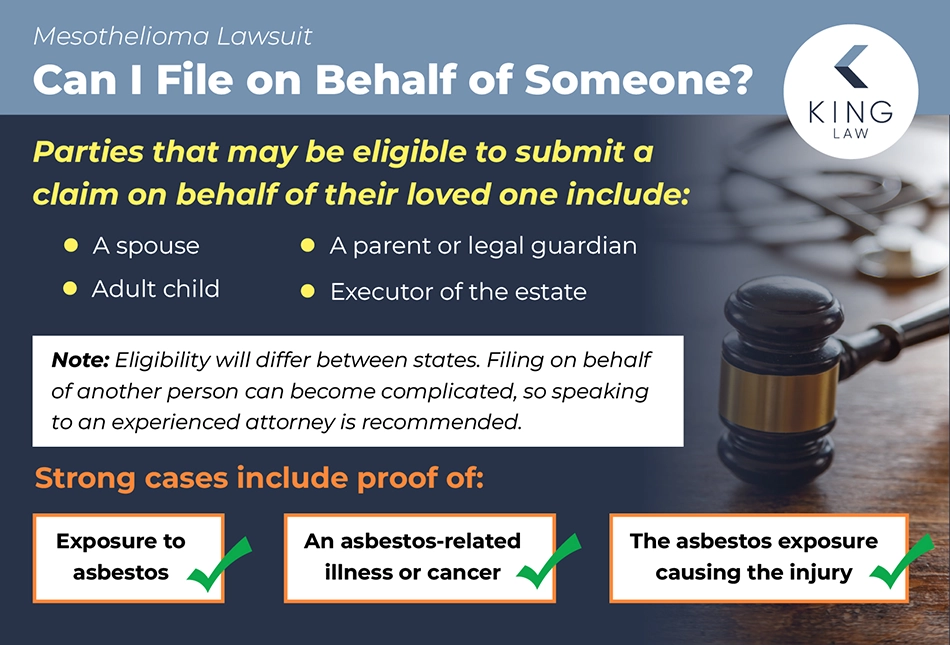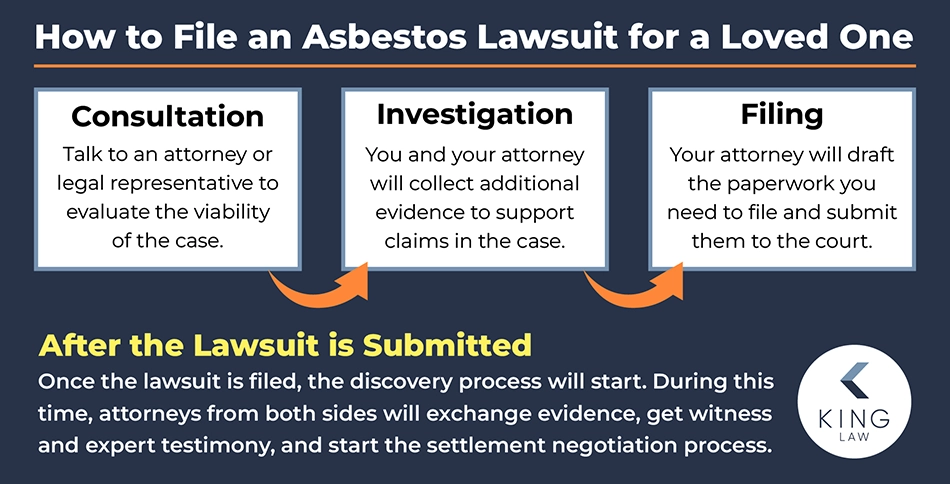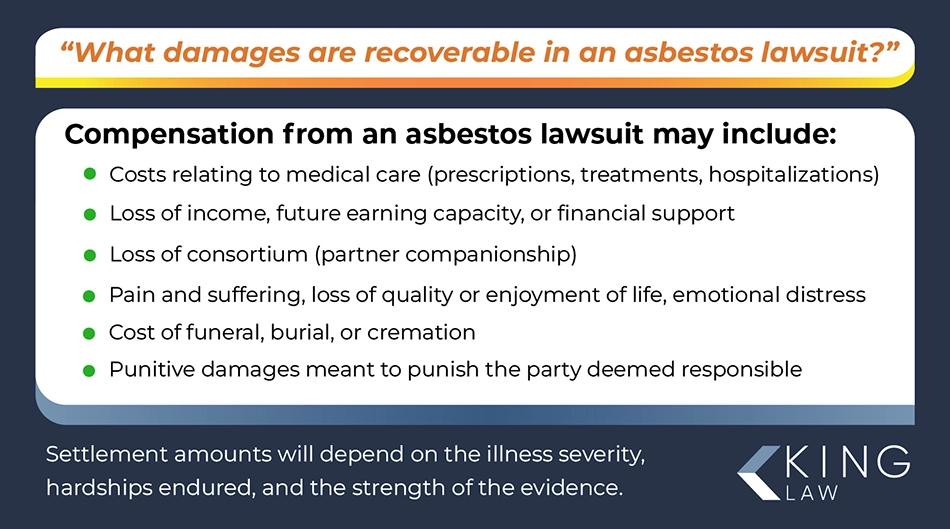Complete the form below to see if you qualify for a Mesothelioma Lawsuit

In many cases, family members of people diagnosed with asbestos-related illnesses may be eligible to file a lawsuit on behalf of the injured or deceased party. Mesothelioma, asbestosis, and lung cancer are devastating diseases that have numerous financial and emotional impacts on the entire family. If the person exposed to asbestos becomes incapacitated or passes away, surviving family members may be able to file a lawsuit against asbestos companies on their behalf.
This page will explore who qualifies to file an asbestos lawsuit on behalf of another person and the types of lawsuits they may file, as well as an overview of what to expect during the filing process.
About the Asbestos Lawsuit for Family Members
Your Right to File an Asbestos Lawsuit for a Family Member
Who Qualifies to File an Asbestos Lawsuit for a Family Member
Types of Asbestos Lawsuits Family Members Can File
What You Need to Prove in an Asbestos Lawsuit for a Family Member
How the Asbestos Lawsuit Process Works for Family Members
Is There a Deadline to File an Asbestos Lawsuit for a Family Member
What Compensation Is Available in an Asbestos Lawsuit for a Family Member
Challenges Family Members May Face When Filing an Asbestos Lawsuit
Benefits of Working With an Experienced Asbestos Lawyer
Your Right to File an Asbestos Lawsuit for a Family Member
U.S. law recognizes the rights of family members to file asbestos-related claims. That means, as a family member, you may be able to pursue a lawsuit against an asbestos company for harming your loved one. If your loved one served in the military, they would not be filing a lawsuit against the government. Service members, especially those who served in the Navy, have especially high rates of mesothelioma. Similarly, those who served in the Marines, Air Force, Army, Coast Guard, and other groups in the military have high rates of mesothelioma because of asbestos exposure at bases.
If your family member passed away before they could file a viable asbestos lawsuit, you may have the right to file a wrongful death claim on their behalf. Similarly, if your family member becomes incapacitated due to an asbestos-related illness, you may be able to file a personal injury lawsuit on their behalf.
Individuals who may be eligible to file on behalf of a deceased family member include spouses, immediate family members, dependents, or representatives of a deceased individual’s estate. Eligibility criteria and deadlines vary from state to state. Eligibility may also vary depending on the type of lawsuit being filed.
In these cases, the family member filing the lawsuit is a third party. The right for third parties to sue acknowledges the hardship that a debilitating illness or death can inflict on family dynamics, emotional well-being, finances, and quality of life. A consultation with an experienced attorney can help determine whether an aggrieved family member or estate representative has grounds to file a claim.
Who Qualifies to File an Asbestos Lawsuit for a Family Member
There are several types of relationships that may qualify an individual to sue on behalf of someone injured by asbestos. If the injured party is still alive, these may include:
- A spouse (such as a wife or husband who died of mesothelioma)
- An adult child
- A legal guardian (if the victim is too ill to file)
In such cases, a family member could only file a lawsuit on behalf of the injured person if that person is incapacitated or too ill to file the lawsuit themselves. So, if an asbestos-related disease has weakened your family member and made them unable to carry out legal tasks, you may be able to file the lawsuit on their behalf.
In cases where the injured individual is passed away from mesothelioma, eligible parties may include:
- A spouse
- Adult child (e.g., a father passes away from mesothelioma)
- Parents
- Executor of the estate
Note that eligibility varies between states and is often based on the physical or mental condition of the victim. Filing lawsuits on behalf of another person can complicate legal matters, and family members should consult with a reputable and knowledgeable attorney to file their case.

Types of Asbestos Lawsuits Family Members Can File
The types of asbestos lawsuits family members can file typically fall under one of two umbrellas: personal injury and wrongful death. Personal injury lawsuits apply when the victim is still alive. Wrongful death lawsuits are also a type of personal injury lawsuit, but these lawsuits are not brought by the person harmed. Instead, a wrongful death lawsuit is filed by surviving family members if the victim has passed away from an asbestos-related illness. Both of these lawsuits are types of civil lawsuits, meaning that one party is seeking damages (compensation) from another party, but there are no criminal implications.
Personal Injury Claims for a Living Family Member
If the victim is alive but unable to file a personal injury lawsuit on their own, a family member may be able to file on their behalf. This scenario typically arises when the victim is too ill to pursue the claim personally. The person filing on behalf of the incapacitated individual may be a spouse, legal guardian, or adult child.
Personal injury lawsuits seek compensation for one or more of the following:
- Medical bills: Expenses accrued in treating an asbestos-related illness.
- Lost wages: If the victim’s condition prevented them from working.
- Future earning capacity: If the loss of the victim affects the future household income.
- Pain and suffering: Loss of quality of life due to physical and emotional fallout from the asbestos-related condition.
- Loss of consortium: Damage to relationships due to disruptions caused by the asbestos-related injury.
- Negligence: On the part of the defendant(s).
- Additional costs: Other financial costs related to the injury.
Case Highlight
In July of 2025, a Massachusetts family received a large award for asbestos exposure and the resulting mesothelioma diagnosis. Paul and Kathryn Lovell have sued Johnson & Johnson because Paul used J&J-brand powders for decades and developed mesothelioma. He and his family have won a $42.6 million verdict, helping connect them with the funds needed to pay for Paul’s enormous medical bills and lost wages. Although Paul’s source of asbestos exposure was unusual, it is part of a larger trend of businesses not protecting consumers from the dangers of asbestos.
Wrongful Death Lawsuits After a Loved One Passes
If the victim has died from an asbestos-related disease, eligible parties may file a wrongful death lawsuit. This type of lawsuit can be filed when someone dies due to the negligence or intentional acts of another person or company. In the case of asbestos lawsuits, the wrongful party is an asbestos company.
A wrongful death mesothelioma lawsuit covers many of the same damages as a personal injury lawsuit. However, it may also include costs related to the funeral and end-of-life expenses. This type of lawsuit also takes into consideration the permanent nature of losses (companionship, financial support, etc).
People are able to file wrongful death lawsuits against asbestos companies because their family members would likely still be alive if that person had not been exposed to asbestos. Surviving family members can hold asbestos companies accountable for their wrongful actions.
Because mesothelioma is a terminal disease, many family members have to assume legal actions after a loved one passes. Many people continue lawsuits against asbestos companies on behalf of loved ones. For example, one family secured millions in compensation after their loved one’s passing.
Examples of Wrongful Death Lawsuits Filed by Family Members
Dr. Alberto A. Casaretto, Sr.’s family has won a $20 million mesothelioma verdict from Johnson & Johnson, the company that made talcum-based baby powder. The jury trial lasted about six weeks. Dr. Casaretto developed mesothelioma and died after using baby powder for cosmetic purposes for years. His surviving family members sued to hold Johnson & Johnson accountable for their loss and to seek much-needed compensation. Eligible family members may be able to file mesothelioma lawsuits if their loved ones get cancer from asbestos.
In another example, the family of a woman who passed away from mesothelioma has won a $1 billion verdict issued by a jury in Los Angeles. $950 million of the damages award is to punish Johnson & Johnson for oppressive and malicious conduct. Records show that the company exposed Mae Moore to asbestos, which is known to cause mesothelioma. However, J&J concealed this information from the public to maximize profits from its product sales. This lawsuit is an example of how family members can continue to pursue legal justice after a family member has passed away from mesothelioma from asbestos exposure.
In another example, a Minnesota mom and her family won a $65 million mesothelioma lawsuit verdict against Johnson & Johnson because of its talcum-based baby powder. The mom was diagnosed with mesothelioma, and her lawsuit claimed that Johnson & Johnson’s personal hygiene products may have been contaminated with asbestos and caused her cancer. This trial verdict, delivered in December 2025, will likely help the woman and her family support themselves during life after her mesothelioma diagnosis.
In February of 2026, a Pennsylvania jury has sided with the family of a woman who died of ovarian cancer after using talc-based baby powder from 1969 to 2017. Before her 2015 diagnosis, she did not know that asbestos could be in talcum powders, like Johnson & Johnson’s baby powder. According to the legal complaint, she continued using baby powder until 2017, when she discovered it could be contaminated with asbestos. In 2019, she filed a lawsuit against Johnson & Johnson, alleging that it failed to warn her about the risks of using its baby powder. The woman died while the case was in its early stages. However, her family continued the lawsuit against Johnson & Johnson, and they have now secured a wrongful death settlement.
What You Need to Prove in an Asbestos Lawsuit for a Family Member
An effective personal injury or wrongful death asbestos lawsuit needs strong evidence. Much of the evidence against the defendant (the asbestos company) will be collected by your legal team. However, the victim’s personal employment and service history will be important proof in your asbestos lawsuit.
As the family member filing the lawsuit, you will need to collect the following proof:
- Proof the victim was diagnosed with an asbestos-related illness such as asbestosis, mesothelioma, or asbestos-related lung cancer. Medical records can support these claims.
- Proof the victim was exposed to asbestos during their time in the military, occupationally, or secondarily. People in certain occupations and industries are at an increased risk of asbestos exposure.
- Proof the diagnosis is related to asbestos exposure and confirmed mesothelioma. Medical records and expert testimonies can support these claims.
How the Asbestos Lawsuit Process Works for Family Members
People filing asbestos lawsuits on behalf of a family member follow a similar process to someone who is filing a lawsuit for themselves. However, as a third-party, you must always be working with the injured person’s best interest in mind.
Although the circumstances of each case are often unique, the process of filing an asbestos lawsuit on behalf of a family member generally follows these steps.
Step 1: Initial Consultation With an Asbestos Attorney
Consulting with an experienced asbestos attorney is the best way to begin the process. The attorney can evaluate the strength of your case, review evidence, set expectations, and inform you of critical filing deadlines. If you move forward with the case, the lawyer can also represent you in pre-trial and court proceedings.
Step 2: Investigation and Evidence Gathering
During this phase, you and your mesothelioma lawyer will collect evidence and depositions to support your case. This may include employment records, military service records, VA records, medical diagnoses, witness testimonies, and documents related to your family member’s exposure and illness.
Step 3: Filing the Claim and Negotiation
After evidence is gathered, your attorney will draft the necessary paperwork to formally file your claim within the statute of limitations. The case will then enter pre-trial proceedings, wherein your lawyer will exchange evidence with the defense, conduct interrogations, and attempt to negotiate a settlement with the defendants or asbestos trust fund. If a settlement can be reached, the case will be closed and you’ll receive a payout. If not, the case will go to trial.
Step 4: Trial or Settlement
Many asbestos lawsuits settle out of court, but if a fair settlement cannot be reached, the case may go to trial. In a trial, both sides will present their arguments and evidence to the court, and a judge or jury will determine liability and compensation. Trials can result in larger or smaller payouts than a proposed settlement, or even none at all.

Is There a Deadline to File an Asbestos Lawsuit for a Family Member
Asbestos lawsuits, whether personal injury or wrongful death, need to be filed within the statute of limitations. Statutes of limitations vary by state, but typically fall within 1 to 3 years of the diagnosis or death. In some cases, the discovery rule may apply if the connection between the injury or death and asbestos exposure was not immediately obvious. In that case, the statute of limitations would begin when the link was discovered.
Because the window of time in which to file is limited, it’s important to act quickly. Your asbestos lawsuit may not be filed in the state you live in. For example, it may be filed in the state where the asbestos company that harmed your family member is headquartered. Statutes of limitations are complicated, so working with an experienced attorney is crucial to make sure your case is filed in time.
What Compensation Is Available in an Asbestos Lawsuit for a Family Member
Compensation in an asbestos lawsuit filed by a family member may cover medical expenses, lost income, pain and suffering, loss of consortium (partner companionship), and other losses. In wrongful death cases, it may also cover funeral and burial costs. In some cases, the defendant (asbestos company) may be liable for punitive damages for wrongdoing. Payouts may vary based on the severity of the diagnosis, hardship faced, and strength of the case. Trial awards may also be larger than settlements should the court rule in your favor.

Settlements & Verdicts for Family Members Filing Asbestos Lawsuits
People who file asbestos lawsuits on behalf of their family members may receive compensation from settlements or jury awards. Your attorney can advise you on which route is better for you and your family, given the circumstances of your case. Settlements are commonly the preferred choice for victims, as asbestos companies have created large trust funds to handle these types of claims. Trials can result in big payouts or no payout at all. So, many families prefer the reliability of a settlement.
Challenges Family Members May Face When Filing an Asbestos Lawsuit
Gathering evidence and testimonies, often many years after the exposure occurred, can be a major challenge in asbestos lawsuits. It can be even harder for family members who were not physically present at the point of exposure and may be missing key details. Complicating matters further, asbestos cases often involve multiple companies, which can make identifying the correct defendants difficult. Mesothelioma claims can take a few months to more than a year to settle, and it can be difficult to be patient during a difficult time.
Due to the complexity of the investigations often involved, working with an experienced attorney to build your case is strongly recommended. Your legal team should have the resources to trace your family member’s asbestos exposure to specific defendants. Identifying the companies at fault would be based on the products your family member used, their occupation, where they were stationed, and other factors.
Benefits of Working With an Experienced Asbestos Lawyer
Given the challenges of building an asbestos case, working with an experienced asbestos lawyer offers numerous benefits. These include:
- Identifying necessary medical evidence
- Identifying necessary evidence of exposure
- Tracking down historical/service/employment records
- Identifying appropriate defendants
- Navigating state laws
- Conducting witness interrogations
- Drafting necessary paperwork
- Identifying legal grounds for the claim
- Working with expert witnesses
- Negotiating with the defense
- Court representation should the case go to trial
These benefits will help relieve much of the burden of filing an asbestos lawsuit on behalf of a family member, as well as increase your chances of success. This article provides practical advise on how to choose an attorney to represent your asbestos claim.
Speak With an Asbestos Lawyer Today
King Law and our legal partners have decades of experience representing clients in asbestos cases. We can help you seek compensation for your family’s suffering before filing deadlines expire. We understand the devastating impacts of asbestos-related diseases. Your family member deserves peace of mind as they navigate their disease and end-of-life care. If you want to learn more about filing a case, contact us at (585) 496-2648 for a free case evaluation.

